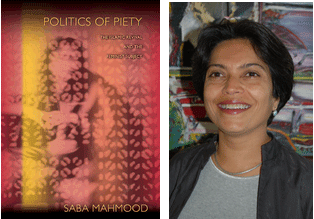
[In 2005 anthropologist Saba Mahmood published “Politics of Piety: The Islamic Revival and the Feminist Subject†(Princeton University Press). This important ethnography of the women’s mosque movement in Cairo not only presents an informative case study but challenges notions of how Muslim women’s involvement in pious movements should be analyzed in a feminist framework. The following excerpt is from the beginning of Mahmood’s book.]
Over the last two decades, a key question has occupied many feminist theorists: how should issues of historical and cultural specificity inform both the analytics and the politics of any feminist project? While this question has led to serious attempts at integrating issues of sexual, racial, class, and national difference within feminist theory, questions regarding religious difference have remained relatively unexplored. The vexing relationship between feminism and religion is perhaps most manifest in discussions of Islam. This is due in part to the historically contentious relationship that Islamic societies have had with what has come to be called “the West,†but also due to the challenges that contemporary Islamist movements pose to secular-liberal politics of which feminism has been an integral (if critical) part. The suspicion with which many feminists tended to view Islamist movements only intensified in the aftermath of the September 11, 2001, attacks launched against the United States and the immense groundswell of anti-Islamic sentiment that has followed since. If supporters of the Islamist movement were disliked before for their social conservatism and their rejection of liberal values (key among them ‘women’s freedom’), their now almost taken-for-granted association with terrorism has served to further reaffirm their status as agents of a dangerous irrationality.
Women’s participation in and support for, the islamist movement provokes strong responses from feminists across a broad range of the political spectrum. One of the most common reactions is the supposition that women Islamist supporters are pawns in a grand patriarchal plan, who, if freed from their bondage, would naturally express their instinctual abhorrence for the traditional Islamic mores used to enchain them. Even those analysts who are skeptical of the false-consciousness thesis underpinning this approach nonetheless continue to frame the issue in terms of a fundamental contradiction: why would such a large number of women across the Muslim world actively support a movement that seems inimical to their “own interests and agendas,†especially at a historical moment when these women appear to have more emancipatory possibilities available to them? Despite important differences between these two reactions, both share the assumption that there is something intrinsic to women that should predispose them to oppose the practices, values, and injunctions that the Islamist movement embodies. Yet, one may ask, is such an assumption valid? What is the history by which we have come to assume its truth? What kind of a political imagination would lead one to think in this manner? More importantly, if we discard such an assumption. what other analytical tools might be available to ask a different set of questions about women’s participation in the Islamist movement?
In this book I explore some of the conceptual challenges that women’s involvement in the Islamist movement poses to feminist theory in particular, and to secular-liberal thought in general, through an ethnographic account of an urban women’s mosque movement that is part of the larger Islamic Revival in Cairo, Egypt. For two years (1995-97) I conducted fieldwork with a movement in which women from a variety of socioeconomic backgrounds provided scriptures, social practices, and forms of bodily comportment considered germane to the cultivation of the ideal virtuous self. The burgeoning of this movement marks the first time in Egyptian history that such a large number of women have held public meetings in mosques to teach one another Islamic doctrine, thereby altering the historically male-centered character of mosques as well as Islamic pedagogy. At the same time, women’s religious participation within such public arenas of islamic pedagogy is critically structured by, and serves to uphold, a discursive tradition that regards subordination to a transcendent will (and thus, in many instance, to male authority) as its coveted goal…
My goal, however, is not just to provide an ethnographic account of the Islamic Revival, It is also to make this material speak back to the normative liberal assumptions about human nature against which such a movement is held accountable — such as the belief that all human beings have an innate desire for freedom, that we all somehow seek to assert our autonomy when allowed to do so, that human agency primarily consists of acts that challenge social norms and not those that uphold them, and so on. thus, my ethnographic tracings will sustain a running argument with and against key analytical concepts in liberal thought, as these concepts have come to inform various strains of feminist theory through which movements such as the one I am interested in are analyzed.
[From Saba Mahmood, Politics of Piety: The Islamic Revival and the Feminist Subject (Princeton: Princeton University Press, 2005), pp. 1-2, 5. Prof. Mahmood teaches in the Department of Anthropology at UC Berkeley.]